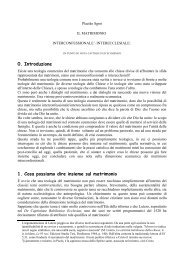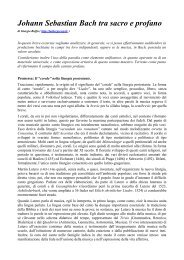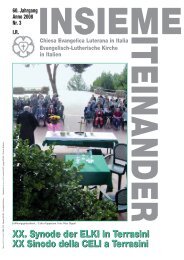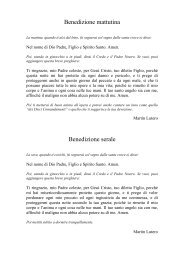Il dialogo ecumenico e interreligioso: quale futuro? - Nemesistemi
Il dialogo ecumenico e interreligioso: quale futuro? - Nemesistemi
Il dialogo ecumenico e interreligioso: quale futuro? - Nemesistemi
Create successful ePaper yourself
Turn your PDF publications into a flip-book with our unique Google optimized e-Paper software.
scommessa ecumenica di santità e di santificazione 1 . Santificazione, si sottolinea, vuol dire<br />
incisivamente santità relazionale e santità sociale 2 . In questa prospettiva, ciò che la gioventù<br />
vede come maggiormente carente nelle Chiese istituzionali è la mancanza di spiritualità nella loro<br />
offerta in seno al mondo: si tratta di spiritualità come esplorazione nelle profondità della propria<br />
identità 3 . Con quest intento, è proprio la trasparenza dell unità che appare come cardine, e non<br />
qualsiasi unità o l unità a qualsiasi costo .<br />
A.<br />
CHIARIMENTI SULL INTENTO<br />
DIALOGALE<br />
basilare sull'argomento: "Questa comunicazione dipende soprattutto da due principi: dalla manifestazione dell unità della Chiesa e dalla<br />
partecipazione in mezzi della grazia La significazione dell'unità per lo più (plerumque) vieta la comunicazione. La necessità di partecipare la grazia<br />
talvolta (quandoque) la raccomanda" (LTR 8). Quindi il decreto lascia all'autorità episcopale del luogo decidere ii concreto tenuto conto delle<br />
circostanze di tempo, e di luogo nonché delle eventuali disposizioni della Santa Sede o delle Conferenze episcopali».<br />
((1) Negli anni 70 una questione ha polarizzato I'attenzione dei cristiani e creato vera tensione tra le Chiese: la questione della communicatio in<br />
sacris, o dell intercomunione' (come si diceva allora) o della "ospitalità eucaristica . I1 Segretariato per l Unione è intervenuto in vari modi. In<br />
particolare con tre documenti: 1. Dichiarazione (7 gennaio 1970) sulla posizionc della Chiesa cattolica circa l Eucaristia comune tra cristiani di<br />
differenti Confessioni, 2. Istruzione (1 giugno 1972) circa casi particolari di ammissione di altri cristiani alla comunione nella Chiesa cattolica, 3.<br />
Nota (17 ottobre 1973) su alcune interpretazioni della Istruzione (1 giugno 1972) circa casi particolari di ammissione di altri cristiani alla comunione<br />
nella Chiesa cattolica . Un talc susseguirsi di documentisullo stesso soggetto indica il problema pastorale, teologico e disciplinare, sottostante e fa<br />
anche intuire Ia passione che una tale discussione suscitava. La questione del resto, sostanzialmentc chiara dat punto di vista cattolico, rimane aperto<br />
nelle relazioni con gli altri cristiani che hanno teologie e prassi diverse. Quci docurnenti tuttavia hanno offerto un sussidio teologico e pastorale utile.)<br />
1<br />
John Paul II, Tend Towards the Ecumenism of Holiness (11 March 2002), in «Internet» 2006, http://www.catholicculture.org/docs/doc_view.<br />
cfm?recnum=4194: «4. By the masterly way she has preserved her heritage of faith and Christian life, the Orthodox Church of Greece has a special<br />
responsibility in all this. During my stay in Athens, I recalled that "the name of Greece resounds wherever the Gospel is preached.... From the<br />
apostolic era until now, the Orthodox Church of Greece has been a rich source from which the Church of the West too has drawn her liturgy,<br />
spirituality and jurisprudence" (Address to Archbishop Christodoulos of Athens and All Greece, n. 3, 4 May 2001). In our responsibility that consists<br />
in tending toward the ecumenism of holiness that, with the help of God, will eventually lead us to full communion meaning neither absorption nor<br />
fusion, but a coming together in truth and love (cf. Slavorum apostoli, n. 27)<br />
10<br />
we must organize our collaboration and work together to make the<br />
voice of the Gospel resound forcefully throughout the Europe that is ours where the Christian roots of the peoples must be revived».<br />
2<br />
J. McMaster (June 2002), Holiness and the Wider Ecumenical Perspective, in «Internet» 2006, http://www.methodist.org.uk/downloads/emtc-paperholiness_and_the_wider_ecumenical_perspective.doc:<br />
«John Wesley envisioned the purpose of the Methodist people as the spread of scriptural<br />
holiness throughout the land. Methodism was to have been a holiness project. This visionary project was about the reform of the nation and the<br />
practice of just economics. It was the growing affluence of the Methodists that led him at the end of his life to judge the Methodist project a failure. 1<br />
This socio-economic and political emphasis has rescued Wesley from the criticism that he was purely individualistic in his theological method and<br />
content. The criticism has some validity but though there are serious gaps in Wesley's theology his description of holiness as perfect love is<br />
essentially a relational and social vision. Wesley's scriptural holiness may not always have been developed into the great social and political ethic it<br />
had the potential to become, yet the latter two decades of the 20th century have produced positive developments in this direction 2 ».<br />
((1) See the paper Wesley on Social Holiness, Dublin, January 2002 by Johnston McMaster. / (2) There are at least five notable contributions towards<br />
the expression of a Wesleyan social and political ethic; M Douglas Meeks, in God the Economist: The Doctrine of God and Political Economy,<br />
(Fortress Press, 1989; Theodore W Jennings in Good News to the Poor: John Wesley's Evangelical Economics, (Abingdon Press, 1990); Manfred<br />
Marquardt in John Wesley's Social Ethics, (Abingdon Press, 1992); Theodore Runyn in The New Creation: John Wesley's Theology Today,<br />
(Abingdon Press, 1998); Theodore R Weber in Politics in the Order of Salvation: Transforming Wesleyan Political Ethics, (Kingswood Books,<br />
2001).)<br />
3 st<br />
S. Kobia, Challenges Facing the Ecumenical Movement in the 21 Century. Keynote address by Rev. Dr Samuel Kobia General Secretary World<br />
Council of Churches, in «Oikumene» (22-10-2005), in «Internet» 2006, www.oikoumene.org/.../ 22-10-05-challenges-facing-the-ecumenicalmovement-in-the-21st-century.html:<br />
«What is it that so many churches and the ecumenical movement to which they have been exposed fail to<br />
provide? The term that usually comes into play in discussing this phenomenon is spirituality<br />
a spirituality understood as existing over against<br />
organized religion. This yearning must be taken into account as we discuss the challenge facing ecumenism in the 21 st century. I fear that the<br />
emphasis on spirituality in contemporary religious discourse provides one more enticement to battle-weary church leaders, and members, to retreat<br />
from social action and public controversy. If people are obsessed with the purely spiritual , runs the argument, then it might mean that our theology<br />
and our practice will turn inward once more. It seems to me that the issue of spirituality as we know it arises as a question of identity. Just as this<br />
question arises in matters of interchurch cooperation and interfaith dialogue, it also affects us both in personal and public life. Unlike the 20 th century,<br />
which was dominated by the politics of ideology, the 21 st century will most likely be dominated by the politics of identity. Who are we? What is the<br />
meaning of our lives and of our relationships to God and one another? How can we explore the depth dimension of human existence? Over the past<br />
two decades, it has become almost politically correct to speak of spirituality in positive terms, where use of the word religion may breed suspicion<br />
and contempt. So let me risk saying one or two politically incorrect things about spirituality as it is often described. The contemporary concept of<br />
spirituality too often embraces a vaguely psychological orientation toward the search for identity and meaning. It may present itself as an adjunct to<br />
the therapeutic, yet often in an uncritically self-affirming way. Indeed, especially in Western culture, the self can easily become the object of an illdefined,<br />
egoistic spirituality. Joseph Campbell s mantra, Follow your bliss , has been used as an excuse for selfishness when it could as easily be<br />
interpreted as an invitation to discover the bliss of engaging creatively with the world».







